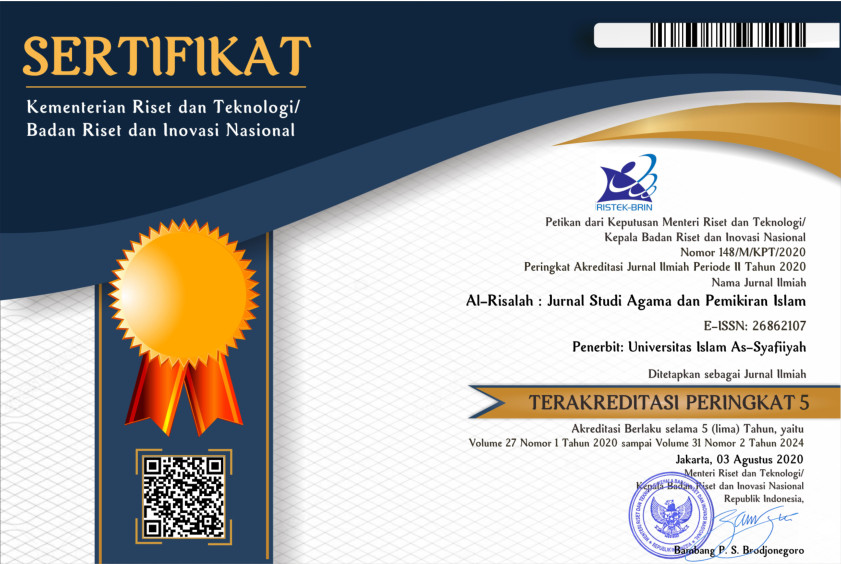IMPLEMENTATION OF DAKWAH IN CAMPUS
(Lembaga Dakwah Kampus/ LDK)
Abstract
Campus Da'wah is the implementation of Ilallah Da'wah within the scope of Higher Education, intended to call academics to the Islamic path by utilizing various formal/informal facilities on campus. Campus da'wah is also a tiny part of the long path of Islamic da'wah, which is considered to have significant value. The sociological aspect of the da'wah strategy is one of the principles that must be considered in carrying out the da'wah strategy, which addresses issues related to the situation and conditions of the da'wah target. This article uses qualitative methods and makes library research and observation of existing campus da'wah institutions the primary source of research. This article try to find out how to know and implement da'wah on campus. LDK as a means of inter-campus da'wah regeneration ties the brotherhood among fellow Muslims in the campus environment. Seeing the many benefits obtained when the implementation of da'wah is implemented in the campus environment, it would be nice for da'wah activities in the campus environment to be reactivated.
References
Agung, M. J. (2015). Renungan bagi aktivis dakwah kampus. Elex Media Komputindo.
Agus Afandi, “Gerakan Sosial Intelektual Muslim Organik dalam Transformasi Sosial”, Jurnal Religio, vol. 2, no. 2, Surabaya: Fakultas Ushuluddin IAIN Sunan Ampel, 2012.
Alam, L. (2016). Internalisasi nilai-nilai pendidikan islam dalam perguruan tinggi umum melalui lembaga dakwah kampus. Istawa: Jurnal Pendidikan Islam, 1(2), 101-119.
Andi Rosadisastra, Metode Tafsir Ayat-Ayat Sains dan Sosial, Jakarta: AMZAH, 2007.
Asmuni Sukir, Dasar-dasar Strategi Dakwah, Surabaya: Al-Ikhlas, 1994
Indriawati, P., & Basri, B. (2022). Penguatan Islam Wasathiyah melalui Organisasi Lembaga Dakwah Kampus. Jurnal Mu’allim, 4(2).
Ismail, A. I., & Uyuni, B. (2020). Theology to Technology; The Shift of Facilities Media Da’wa in Millennial Era.
Majid, Z. A., Al Yusni, D. H., Himayah, M., & Uyuni, B. (2021). THE EFFECT OF MODERN AND CONTEMPORARY ISLAM ON THE CRITICAL THINKING OF ISLAMIC FIGURES. Spektra: Jurnal ilmu-ilmu sosial, 3(2), 43-55.
Ridwan, M., & Rewira, A. E. (2021). DAKWAH KAMPUS: TRANSFORMASI DAKWAH TEKSTUAL KE DAKWAH KONTEKTUAL RASIONAL. KARIMIYAH: Journal of Islamic Literature and Muslim Society, 1(1), 53-62.
Rizal Mahri, MANAJEMEN DAKWAH LDK AL – INTISYAR UIKA DALAM MENINGKATKAN KUALITAS DAKWAH KAMPUS. Komunika: Journal of Communication Science and Islamic Da'wah Volume 2 (2), 2018
Setiawan, A. I. (2011). Efektivitas Dakwah Fi’ah: Studi Model Dakwah pada Lembaga Dakwah Kampus. Ilmu Dakwah: Academic Journal for Homiletic Studies, 5(18), 541-574.
Uyuni, B., & Adnan, M. (2020). The Challenge of Islamic Education in 21st Century. SALAM: Jurnal Sosial dan Budaya Syar-i, 7(12), 1079-1098.
Uyuni, B., & Muhibudin, M. (2020). COMMUNITY DEVELOPMENT: The Medina Community as the Ideal Prototype of Community Development. Spektra: Jurnal ilmu-ilmu sosial, 2(1), 10-31.
Widiati, H., & Musaddad, E. (2019). Strategi dakwah Lembaga Dakwah Kampus (LDK) dalam meningkatkan religiusitas mahasiswa. AdZikra: Jurnal Komunikasi & Penyiaran Islam, 10(1), 50-76.
Copyright (c) 2022 Tahdzib Al-Akhlaq: Jurnal Pendidikan Islam

This work is licensed under a Creative Commons Attribution 4.0 International License.
This work is licensed under a Lisensi Creative Commons Atribusi 4.0 Internasional.
Authors who publish with this journal agree to the following terms:
- Authors retain copyright and grant the journal right of first publication with the work simultaneously licensed under a Creative Commons Attribution License that allows others to share the work with an acknowledgment of the work's authorship and initial publication in this journal.
- Authors are able to enter into separate, additional contractual arrangements for the non-exclusive distribution of the journal's published version of the work (e.g., post it to an institutional repository or publish it in a book), with an acknowledgment of its initial publication in this journal.
- Authors are permitted and encouraged to post their work online (e.g., in institutional repositories or on their website) prior to and during the submission process, as it can lead to productive exchanges, as well as earlier and greater citation of published work (See The Effect of Open Access).





